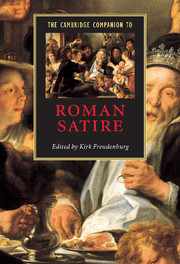Book contents
- Frontmatter
- Introduction
- Part I Satire as literature
- Part II Satire as social discourse
- Part III Beyond Rome
- 14 Roman satire in the sixteenth century
- 15 Alluding to satire
- 16 The Horatian and the Juvenalesque in English letters
- 17 The “presence” of Roman satire
- Conclusion
- Key dates for the study of Roman satire
- Bibliography
- Index
- Series list
16 - The Horatian and the Juvenalesque in English letters
from Part III - Beyond Rome
Published online by Cambridge University Press: 28 May 2006
- Frontmatter
- Introduction
- Part I Satire as literature
- Part II Satire as social discourse
- Part III Beyond Rome
- 14 Roman satire in the sixteenth century
- 15 Alluding to satire
- 16 The Horatian and the Juvenalesque in English letters
- 17 The “presence” of Roman satire
- Conclusion
- Key dates for the study of Roman satire
- Bibliography
- Index
- Series list
Summary
It is a time of trouble in California. Deaths from AIDS are everywhere. Nor is the wider political scene much brighter. In Reagan’s America the poor queue up for private charity. Thom Gunn writes to his brother from San Francisco to invite him to come and share dinner, walks, talk, community. The tone - intimate, conversational, relaxed, jokey, detached - darkens as Gunn turns to current discontents:
By then you will have noticed those
Who make up Reagan’s proletariat:
The hungry in their long lines that
Gangling around two sides of city block
Are fully formed by ten o'clock
For meals the good Franciscan fathers feed
Without demur to all who need.
You'll watch the jobless side by side with whores
Setting a home up out of doors.
And every day more crazies who debate
With phantom enemies on the street.
I did see one with bright belligerent eye
Gaze from a doorstep at the sky
And give the finger, with both hands, to God:
But understand, he was not odd
Among the circumstances.
Well, I think
After all that, we'll need a drink.
The struggles of the poor are seen from a relatively comfortable Horatian outside, and the middle-class punch-line about needing a drink moderates any undue saeva indignatio. The greater part of the poem depicts the two brothers enjoying middle-aged pleasures: observing the neighbors, taking a trip on the ferry, climbing the hills, and preparing their dinner, with some elision of the political. This, we may say, is “Horatian” sermo, from 1992.
- Type
- Chapter
- Information
- The Cambridge Companion to Roman Satire , pp. 284 - 298Publisher: Cambridge University PressPrint publication year: 2005
- 2
- Cited by



